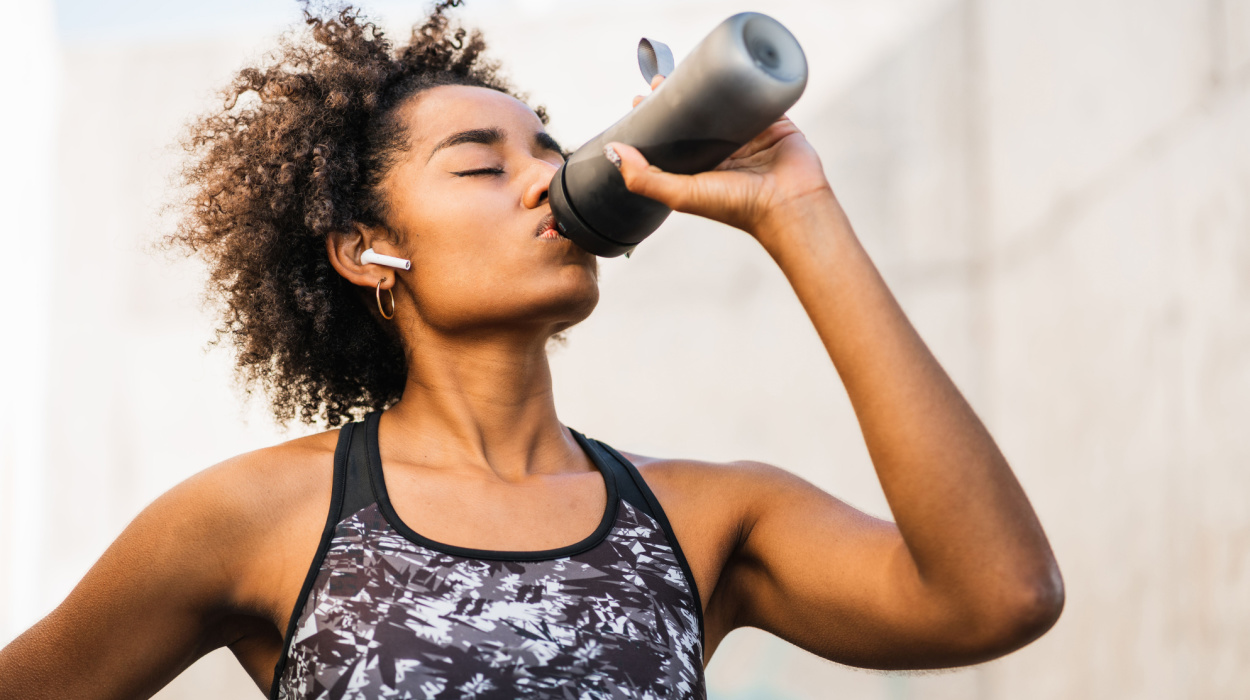Are you curious about how much water you should drink to lose belly fat? Many of us wonder about the connection between drinking water and losing weight, especially regarding reducing abdominal fat. Is drinking more water all it’s cracked up to be?
This article will explore the intriguing relationship between water intake and weight loss, specifically focusing on how it can burn fat. We’ll explore the science to explore how much belly fat you can lose by drinking water and how vital adequate hydration is to your body’s fat metabolization process. Keep reading to see how this information transforms into practical tips for a myriad of health benefits.
How Much Water Should You Drink To Lose Belly Fat?
Drinking water is a simple way to support losing belly fat. The amount of water you should drink varies depending on several factors, including:
- Weight.
- Muscle mass.
- Physical activity.
- Fluid intake from food.
- Kidney health.
- Salt consumption.
- Chronic health conditions, such as diabetes.
A good place to start is with half an ounce to an ounce of water for every pound of body mass. If your urine is dark, increase your daily intake until your urine is a pale yellow.
How Much Water Should I Drink To Lose Belly Fat?
How Water Helps You Lose Weight

Water is a vital component of any healthy lifestyle. It’s not just about quenching thirst; water is crucial to the body’s metabolic processes. Drinking enough water helps your body:
- Effectively burn calories. When you stay hydrated, your body can metabolize stored carbs and fats properly.
- Maintain a healthy body temperature. Drinking enough water is necessary to regulate peak cardiovascular and metabolic responses, and calories are burned when you consume cold water that your body must warm to use.
- Consume fewer calories. Cutting out other beverages helps reduce calorie intake, and drinking water before meals[1] helps prevent overeating.
Dehydration is the process of losing body water, and hypohydration is the medical condition caused by too much dehydration. Chronic hypohydration, even mild, is associated with increased body weight. Animal studies suggest that the excess weight gain may be influenced by angiotensin II,[2] or AngII, the hormone regulating body fluid, though more research is needed.
Why Dehydration Can Lead To Weight Gain
AngII stimulates thirst, salt cravings, hormones to make the kidneys conserve water, and the vasoconstriction of all organs and cells. Though these responses are appropriate to reverse hypohydration, chronically elevated AngII appears to be associated with several chronic diseases[2] that also involve metabolic dysfunctions, including:
- Cardiovascular disease.
- Obesity.
- Diabetes.
- Cancer.
- Alzheimer’s disease.
- Kidney stones.
Some studies speculate that chronic hypohydration could be causing the continuous release of AngII, triggering or amplifying[3] the metabolic dysfunction found in these illnesses. Whether this is true or not, it is clear that drinking more water can improve the weight loss outcomes of those who suffer from these conditions.
Calculating Your Optimal Daily Water Intake
Determining how much water you should drink to lose belly fat involves more than following general recommendations. Your target water intake[4] depends on several factors, such as:
- Body mass.
- Body composition.
- Physical activity.
- Fluid intake from food.
- Kidney health.
- Salt consumption.
- Chronic health conditions, such as diabetes.
- Age.
- Pregnancy/breastfeeding.
A commonly suggested guideline is to drink approximately half an ounce to an ounce of water for each pound of body weight. For example, a person weighing 150 pounds might aim for 75 to 150 ounces of water daily. While this is a good starting point for staying hydrated, consistent with recommendations[4] by European and American health officials, there’s no foolproof universal formula that precisely prescribes how much water you should drink to achieve any specific goal.
Adjusting For Activity Level
While it’s probably no surprise that breaking a sweat causes an increase in your hydration needs, you may be surprised just how much more water[5] you need to consume to make up for it. Here are some guidelines:
- Hydrate before exercise. Aim to consume 16-24 ounces of water around 3 hours before exercise.
- Hydrate during exercise. Exact amounts vary depending on your starting hydration level and degree of exertion but expect to need up to a liter or four glasses of water for every hour of exercise.
- Hydrate after exercise. If you cannot hydrate before or during your activity, make up for it as soon as possible.
- Replace electrolytes. You’ll need them if you’ve been sweating for an hour or more. Just be aware that many sports drinks are high in sugar, so you should seek low-calorie options.
- Don’t overdo it. Be mindful of drinking too much water too quickly. While serious illness[6] due to overhydration is rare, it does not take that much fluid on an empty stomach to lead to uncomfortable cramps and stomach pain.
If you’re dehydrated after a workout, catch up on fluids before your next session to avoid hypohydration, muscle cramps, and impaired performance.
Individual Factors And Variability
Individual factors can also affect how much water you need to drink for optimal weight loss. Age, gender, personal habits, and health conditions all impact your overall hydration. You also want to make sure you have access to good quality drinking water that isn’t full of chemicals.
For example, pregnant or breastfeeding individuals will need to consume more fluids. People with kidney problems must work closely with their urologist or nephrologist. A diet high in water-rich foods like fresh produce and soups will reduce the fluids you need to drink.
The most straightforward way to determine your water needs is to track your fluid intake and see if it results in pale yellow urine. If your urine is darker than straw color, increase your intake.
How Much Belly Fat Can You Lose By Drinking Water?
Drinking water can aid in weight loss, including loss of belly fat, but it’s not a stand-alone solution. While some studies have shown a positive correlation between increased water intake and weight loss, others have found minimal or no direct impact[7] on weight loss solely due to drinking water. But what does this mean?
Realistic Expectations And Timeframes
When approaching any goal, you must set realistic expectations. Increasing water intake should be a supportive strategy to complement a broader weight loss plan. Any comprehensive agenda should include a balanced diet, regular exercise, and other lifestyle and mental health adjustments.
Realistic expectations would look like a gradual and steady weight loss of no more than 2 pounds per week, though individuals with more weight may lose faster. If you’re struggling with obesity, it’s important to discuss with your doctor what target weight and date is reasonable for an individual in your unique situation.
Case Studies
Numerous success stories highlight the role of water in losing weight and specifically targeting belly fat. For instance, some studies involving overweight female[8] participants have shown that those who increased their water consumption lost more weight compared to those who didn’t. This weight loss was partly attributed to reduced appetite and lower calorie intake, a boost typically seen with weight loss supplements.
Case studies demonstrate how replacing high-calorie drinks with plain water can lead to weight loss. Drinking water or diet soda instead of sugary beverages[9] like sports drinks reduces your liquid calorie intake and helps the fat metabolization process.
Staying hydrated helps maintain optimal body function, which is crucial for exercise efficiency and fat loss. Proper hydration ensures that your muscles, connective tissues, and joints work effectively, making your workouts more productive.
While drinking water alone won’t magically melt away belly fat, it plays a significant role in a comprehensive weight loss program. Increased water intake and a healthy lifestyle can help you achieve and maintain a healthier body composition.
Other Tips To Follow
Significant weight loss will likely require more than just boosting your water intake. Let’s dig into what these complementary strategies look like.
Diet And Nutrition
Increasing your fluid intake isn’t just about drinking more water. Here are some tips for improving your diet for losing belly fat:
- Consume water-rich foods. Munch on fresh produce like cucumbers, tomatoes, and watermelon. These foods also provide electrolytes and fiber, which help with hydration and digestion.
- Opt for whole grains and lean protein sources. These nutrient-dense foods help you feel energized and full.
- Limit processed foods and beverages high in sugar and alcohol. These treats are okay occasionally, but the excess calories bring little nutritional value, leaving you hungry and low-energy after meals.
Exercise Frequently
Physical activity is another key component of losing weight and avoiding excessive fat.
Cardiovascular exercises like brisk walking, running, or cycling effectively burn calories. Strength training is just as beneficial, as it helps build muscle mass, increasing your resting energy expenditure.
Remember, though, that spot reduction of fat is a myth. Exercises targeting the abdominal area can tone the muscles underneath the fat and contribute to your calorie deficit. Still, a well-rounded exercise routine[10] is the best approach for significant results.
Sleep And Stress Management
Lifestyle changes are integral for losing and keeping weight off.
For example, lack of sleep can disrupt hunger hormones, leading to increased appetite and potential weight gain. Anyone hoping to lose weight should aim for 7-9 hours of quality sleep per night.
High stress levels can lead to emotional eating and increased fat storage, especially around the belly. Mindfulness, yoga, or simple breathing exercises can help manage stress levels.
Make it a habit to drink plenty of water throughout the day and maintain a balanced diet. Consistency over time leads to significant results in belly fat reduction.
Tips For Increasing Your Water Intake
You can read about how increasing your water intake can help you lose weight, but it only works if you do it. If drinking enough plain water is difficult for you, consider these strategies:
Flavor Infusions And Alternatives
Make your glass of water more appealing with an infusion of natural flavors. Use fruits, vegetables, or herbs to keep things interesting. Beverages like herbal tea or seltzer water are also great calorie-free hydration options.
While diet drinks are better than their sugary counterparts, they’re still not as good as unsweetened options. Artificial sweeteners have different physiological effects[11] that may impact your blood sugar or metabolism. More research is needed, so it’s best to avoid them.
Experiment with different flavor combinations and alternatives to keep your water intake interesting and enjoyable. If you can make hydration a pleasurable experience, you’ll be more likely to reach your daily water intake, and it will take less effort.
Water-Rich Foods

Incorporating water-rich foods into your diet is another excellent way to boost your hydration levels and aid in your weight management efforts. Cucumbers, tomatoes, and watermelon provide essential vitamins and minerals and contribute to your overall water intake.
By consuming these water-rich foods, you can stay hydrated, support your weight loss goals, and enjoy delicious and nutritious meals.
Tracking And Reminders
Apps, trackers, alarms, and timers can help you track your water intake throughout the day, and gamifying the process is a great way to stay engaged and motivated.
In addition to apps, you can use simple visual cues like keeping a special cup or water bottle in a conspicuous place. Keeping a reusable water bottle handy is a practical way to ensure you meet your daily intake goals. A container with water volumes printed on the side is particularly helpful.
Remember, though, while water is essential for fat loss, it should be part of a broader weight loss journey that includes healthy eating and regular physical activity.
Conclusion
While drinking water is essential in your journey to lose belly fat, it’s just one piece of a larger puzzle. You must consider your weight, physical activity level, and health conditions.
Remember, there’s no quick fix to losing weight; it’s about making sustainable changes with balance and consistency.
Stay consistent with your water intake, maintain a healthy diet, and stay active. By doing so, you can shed fat and improve your overall health and well-being. Let’s embrace these changes and move towards a healthier, happier you!
Frequently Asked Questions
Drinking water can reduce your appetite, boost metabolism, and promote weight loss. When combined with a balanced diet and regular exercise, water intake can significantly impact your outcome.
The amount of water you should drink can vary based on many factors. A general guideline is to drink half an ounce to an ounce of water daily for each pound of your body weight.
Water fasting can result in weight loss, including reducing belly fat. However, it’s not a sustainable or safe long-term weight loss method. While helpful to jumpstart your process, long-term dietary habits must change for lasting results.
Though rare, water intoxication from drinking too much water too quickly can be a serious condition. You shouldn’t try to drink more than 1 liter of water[5] per hour but always listen to your body.
 Evidence Based
Evidence Based
